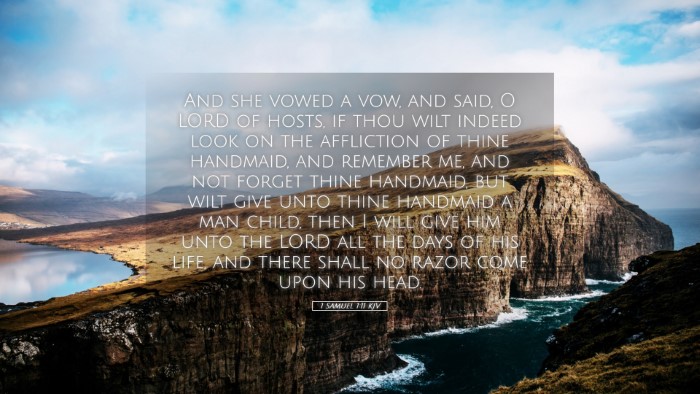Commentary on 1 Samuel 1:11
Verse: 1 Samuel 1:11 (KJV) - "And she vowed a vow, and said, O Lord of hosts, if thou wilt indeed look on the affliction of thine handmaid, and remember me, and not forget thine handmaid, but wilt give unto thine handmaid a man child, then I will give him unto the Lord all the days of his life, and there shall no razor come upon his head."
Introduction
The text of 1 Samuel 1:11 is pivotal in understanding the character of Hannah, the themes of prayer, divine intervention, and the promise of dedication to God. Hannah's vow underlines an intense personal relationship with God, revealing both her desperation and faith. This commentary seeks to unpack this verse using insights from renowned public domain theologians including Matthew Henry, Albert Barnes, and Adam Clarke.
Hannah's Vow: A Study of Faith and Devotion
Hannah’s heartfelt petition exemplifies the essence of sincere prayer. Matthew Henry emphasizes that Hannah’s vow is not merely a desperate plea but a covenant of her devotion and gratitude to God. The specificity of her request—a male child—reflects cultural values of the time, where lineage and male descendants were highly prized.
Albert Barnes notes that vows in the Biblical context often represented a commitment to God that extended beyond mere supplication; they were solemn promises reflecting deep spiritual truths. Hannah's willingness to dedicate her child back to God illustrates her profound faith and understanding of God's sovereignty over life and circumstance.
The Role of Prayer in Hannah's Life
The fervency of Hannah's prayer continues to resonate in the practices of believers today. According to Adam Clarke, her petition is marked by an immeasurable depth of sorrow and the palpable burden of her affliction. This agony prompts her to approach the Lord with both honesty and fervor. The embrace of personal anguish in prayer highlights a divine principle: God is near to the broken-hearted (Psalm 34:18).
Furthermore, Clarke points out that her method of prayer—silent yet fervent—exemplifies how God values heartfelt communication over ritualistic formality. This intimate exchange between Hannah and God is emblematic of the authentic relational dynamics that God desires with His people.
God's Response and the Fulfillment of Vows
Hannah's vow is pivotal in her spiritual journey and underscores God's responsiveness to our needs. Matthew Henry articulates this beautifully, stating that God honors all sincere prayers offered in faith. Henry further emphasizes that the act of vowing itself is a demonstration of faith, and God delights in fulfilling the promises made to those who earnestly seek Him.
Albert Barnes expounds on the theological implications of Hannah's vow, suggesting that her promise to dedicate her son Samuel to the Lord sets a precedent for future generations regarding the importance of dedicating not only offspring but all blessings to God.
The act of Samuel being dedicated to God from birth signifies the primacy of spiritual priorities in the life of a believer. By committing the child to God, Hannah exemplifies the principle that every blessing is a gift from God, and thus, should be returned to Him in gratitude and service (James 1:17).
The Significance of "No Razor" and the Nazarite Vow
The phrase "and there shall no razor come upon his head" is significant in relation to the Nazarite vow, which denotes a life set apart for God’s service. As highlighted by Adam Clarke, this commitment not only affects Samuel but also sets a standard for sacred dedication in the lives of believers. The Nazirite vow embodies holiness and separation from common practices, signifying a life wholly devoted to God's purposes.
Matthew Henry expands on this by stating that Hannah’s resolution implicitly teaches about the positive impacts of consecration. The raising of Samuel as a Nazirite serves as an example of how children should be nurtured in environments of faith, with parents modeling dedication and service to God.
Lessons for Modern Believers
Hannah's pledge presents several contemporary applications for pastors, students, theologians, and Bible scholars today:
- Authenticity in Prayer: Like Hannah, believers are encouraged to come before God with their authentic selves, expressing their deepest needs and emotions.
- The Power of Vows: A vow is a serious commitment that should not be taken lightly. Both public and private commitments to God should be upheld with diligence and sincerity.
- Prioritizing God's Will: The willingness to dedicate oneself or one's children to God's service is a powerful testament of faith and should be communicated with sincerity and intention.
- God's Faithfulness: Hannah's story reassures believers of God's attentiveness to their prayers and His unyielding faithfulness in fulfilling His promises.
Conclusion
1 Samuel 1:11 serves as a profound illustration of faith, devotion, and the power of prayer. Hannah’s earnest request and the promise of dedication illuminate key values of reliance on God and the importance of spiritual commitment. Through the combined insights of public domain commentaries, we learn that Hannah’s vow is not only a personal plea but a foundational moment in the narrative of salvation history, foreshadowing the significant role Samuel would play in Israel's redemption and covenantal life. This text richly invites us to reflect on our own commitments to God and challenges us to embrace the truth that our prayers, uttered in sincerity, are met by a God who listens and responds with grace.


